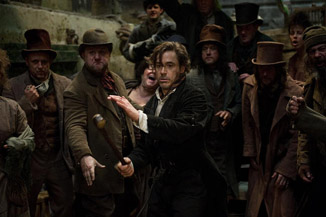|
|
Movie Review: Sherlock Holmes: A Game of ShadowsBy Matthew HuntleyDecember 19, 2011
For a movie that centers mostly on action and style - director Guy Ritchie throws in his usual motion effects and epileptic editing techniques - we do find ourselves getting wrapped up in the plot. Downey deserves much of the credit because, as Holmes, we take pleasure in hearing him talk and explain things to us. He’s so charming and droll that we marvel in his theories, not to mention his quick exchanges with Law, who’s a good match because he brings a convincing sensibility to the part of Watson. Their chemistry and back-and-forth banter is a real treat and it’s one of the main reasons to see A Game of Shadows, along with the battle of wits between Downey and Harris, whose Moriarty is a sophisticated and developed villain. He’s not just a run-of-the-mill bad guy, or at least Harris doesn’t make him that way. Rapace, unfortunately, gets overshadowed. She mostly sits in the background and functions merely as a device for the plot. It’s a shame she wasn’t allotted more time to develop quirks and idiosyncrasies because she fully embraced them in the Swedish version of The Girl with the Dragon Tattoo. Here, she seems under-utilized. I've never read any of the Sir Arthur Conan Doyle novels or short stories in which Holmes appeared, but as a film series, Sherlock Holmes is a solid one and so far two for two. If you were a fan of the original, you can assume you’ll like A Game of Shadows. And while I did enjoy it, I think if the franchise wants to keep going, it has to shake things up a bit, perhaps by introducing a new director with a different style or a plot that is more far-reaching and risky. Granted, they’re good here, but we’re in an era of cinema where ideas are so thin that filmmakers can only rely on “the same” for so long before they become tired. But based on the first two installments, I’m confident that if the same energy and enthusiasm are demonstrated with subsequent Sherlock Holmes movies, there's little reason to think audiences will not follow him in future adventures.
|

|
|
|

|
Thursday, October 31, 2024
© 2024 Box Office Prophets, a division of One Of Us, Inc.


